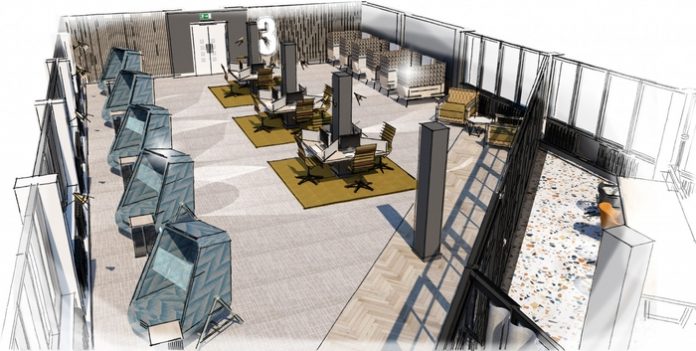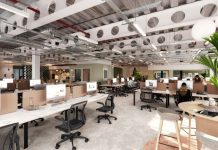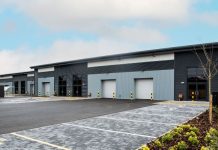Following the global COVID-19 pandemic, many businesspeople – both employees and employers –are feeling uncertain about the future of their jobs and how the world of work will look in the coming years. Although the news of an impending vaccine signifies the return to ‘normal’, it is likely that the business learnings of 2020 will continue to shape the future of the workplace.
The north’s largest out of town business park, Warrington-based Birchwood Park, has conducted a study into exactly what the future of the workplace will look like in the next 5-10 years. The majority of these changes will manifest themselves in the form of technological, architectural and wellbeing-focused changes.
To bring these changes to life, Birchwood Park has worked with esteemed futurologist, Dr Ian Pearson and workplace wellbeing expert, Khalil Rener.
The main predictions for the office of the future are:
- Workplace satisfaction – workplace satisfaction will be founded in sensory surroundings and judged on air, light and sound quality and will be an employer’s responsibility to ensure that the office they provide for their staff is more than adequate to meet both mental and physical needs. Expect to also see a rise in flexi working – if COVID-19 has taught businesses anything, it’s that they can still survive and thrive whilst their employees work from home and enjoy a greater work/life balance.
- A holistic approach to wellbeing – we will begin to see businesses offering greater support to employees: promoting healthy eating habits, an active lifestyle, greenery and open spaces, and, perhaps most importantly, more mental health support and provisions.
- A shift in office layouts – floor spaces will be reconfigured to allow for teleworking/hotdesking, with individual working pods installed to allow for solo working. Soundproof screens will be commonplace in years to come, allowing employees to shift quickly between solo and collaborative working without disruption. Private phone hubs will be a must, and for those seeking privacy or relaxation, sound-proofed breakout hubs will feature.
- Touch free tech – wall-mounted temperature check facilities and touch-free devices (automatic doors etc) will become commonplace, as will purpose-built sanitisation stations.
- Prevention of disease spread – more high-tech devices will be installed to minimise contamination – permanent air conditioning with heaper filters to filter viruses out of the air will become standard issue, and UV light sterilisation will mean that areas are properly safe for workers.
- Portable tech – predicted to tie into the increased need of greater flexibility in the way employees use the office; core working hours, rota systems to split time between the office and home working, and an increase in teleworking and hot desking.
Results from an on-park survey reveal that only 11% of companies are currently working from the office full time, with 16% concerned about being based in an office full time, regardless of additional safety procedures.
Despite these statistics, only 18% would be happy with working remotely for the foreseeable future, instead eager to embrace a new style of working where office and flexi time is fluid and can be interchangeable from week to week.
The study revealed that both employees and employers still see a need for the physical office, but that they would like to see changes to accommodate for, among other things, the Coronavirus. Respondents stated that they predict the most notable changes to the workplace of the future will be seen in the areas of technology (38%), social (25%), wellbeing (20%) and architecture (13%).
The main concerns for returning to the office were the ability to effectively social distance (21%), the level of health and safety procedures (24%), with the main attractions of returning to a physical office including the social interaction element (38%) and experiencing a different environment between work and home.
Martin O’ Rourke, commercial director of Birchwood Park said: “We are witnessing times of change; for all businesses regardless of sector and speciality, and for all employees regardless of profession or position, working habits have changed vastly from what they once were – with the need to adapt being quickly realised.
Though the days of the traditional office-based 9am-5pm working week are gone, the office continues to play a hugely important role for business. In order for the full potential of office space to be realised, we need to see shifts in the way businesses address the needs of individuals.
Although the predictions are set to take place across the next 5-10 years, we are already seeing changes emerge across businesses UK wide, especially in the wellbeing space. I’m proud to be able to say that Birchwood Park already boasts vast green space and a lake, an on-site gym, many community-focused initiatives and a pioneering eat, meet and work space. All of these have proven invaluable in supporting the mental health and wellbeing of employees during the COVID-19 outbreak, and we will strive to continue to place employee wellbeing at the top of our agenda – change is coming – and it’s exciting.”
Warrington-based design agency, DV8 has worked with the experts to create a visual conception of the office of the future – and it features calming colourways, breakout pods and sanitisation stations.





















